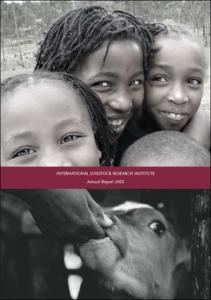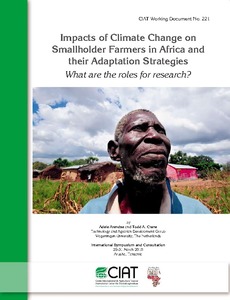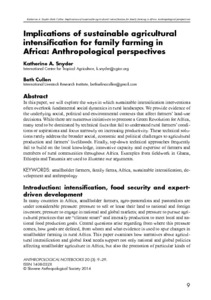Household opportunity costs of protecting and developing forest lands in Son La and Hoa Binh Provinces, Vietnam
Vietnam has pilot-tested a payment for forest environmental services (PFES) program in an effort to restore and protect forest areas, some of which have been severely degraded by the excessive cutting of trees by small-scale farmers planting annual crops on steep, sloping lands. The pilot program implemented in southern Vietnam seems to be successful, yet the program in northern Vietnam has not produced the desired rates of planting and maintaining forest areas.
ILRI annual report 2002. Better lives through livestock - research serving the millennium goals
This publication provides sharper focus on reducing poverty where it is most absolute and most wide spread. This review outlines a new strategic goal, collaborative ways in which the institute is enhancing its responsiveness to the fast - changing global environment; and five new research themes, viz, Targeting opportunities, Enabling Innovations, Market opportunities, Biotechnology and people, and Livestock and the Environment. The review also identifies three broad pathways, viz security assets, improving productivity, and accessing markets.
Implications of sustainable agricultural intensification for family farming in Africa: anthropological perspectives
In this paper, we will explore the ways in which sustainable intensification interventions
often overlook fundamental social dynamics in rural landscapes. We provide evidence of
the underlying social, political and environmental contexts that affect farmers’ land-use
decisions. While there are numerous initiatives to promote a Green Revolution for Africa,
many tend to be dominated by technical fixes that fail to understand rural farmers’ condi
-
tions or aspirations and focus narrowly on increasing productivity. These technical solu
-
Increased water charges improve efficiency and equity in an irrigation system
Conventional wisdom in many agricultural systems across the world is that farmers cannot, will not, or should not pay the full costs associated with surface water delivery. Across Organisation for Economic Co-operation and Development (OECD) countries, only a handful can claim complete recovery of operation, maintenance, and capital costs; across Central and South Asia, fees are lower still, with farmers in Nepal, India, and Kazakhstan paying fractions of a U.S. penny for a cubic meter of water. In Pakistan, fees amount to roughly USD 1-2 per acre per season.
Integrating improved germplasm and resource management for enhanced crop and livestock production systems: Project PE-5: Sustainable Systems for Smallholders: Annual Report 2000
Investing in agricultural water management to benefit smallholder farmers in Madhya Pradesh, India.
This Working Paper summarizes research conducted as part of the AgWater Solutions Project in the State of Madhya Pradesh, India, from 2009 to 2012. Agriculture accounts for 21% of the gross domestic product (GDP) of Madhya Pradesh and state agriculture contributes substantially to India?s total annual wheat, pulses and soybean production. While the incidence of poverty has declined, it remains well above the national average of 21%.





